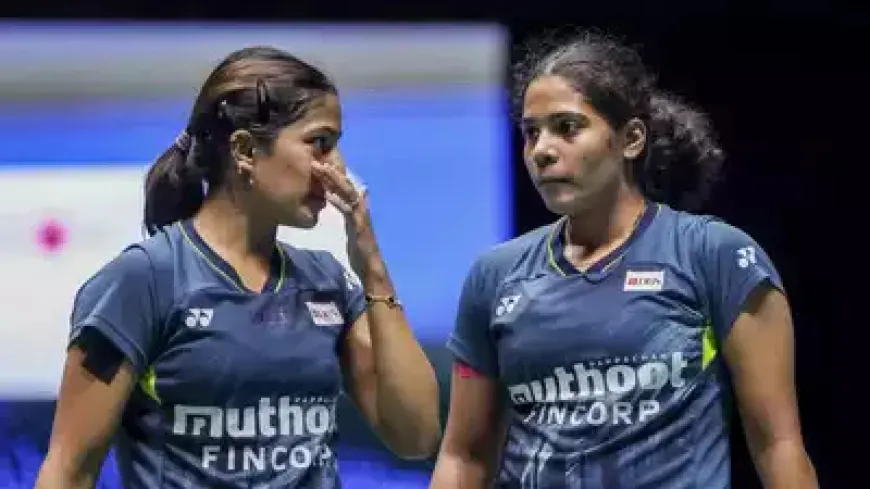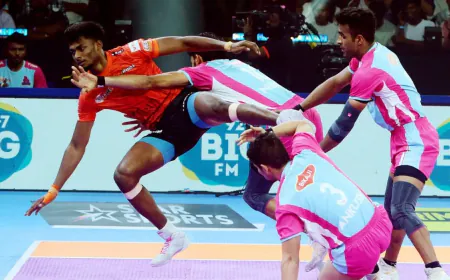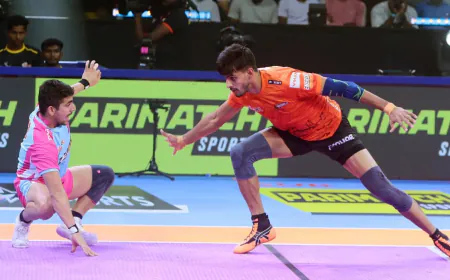Macau Open: Treesa Jolly and Gayatri Gopichand’s Journey Ends in Semifinals
Looking Ahead for the Indian Pair As Treesa and Gayatri continue to grow as a team, their focus will likely be on refining their tactics and improving their ability to maintain momentum throughout an entire match. Their semifinal exit in Macau, while disappointing, also serves as a learning experience. Facing opponents like Hsieh and Hung, who have consistently posed challenges for them, will help the Indian duo identify key areas for improvement, such as their early game strategy and their ability to respond to aggressive play from their opponents.

India's badminton duo, Treesa Jolly and Gayatri Gopichand, saw their campaign at the Macau Open Super 300 come to an end in the semifinals. Despite putting up a strong fight, the third-seeded Indian pair lost to Chinese Taipei’s Hsieh Pei Shan and Hung En-Tzu, marking their third defeat against these opponents this year. The final scoreline read 17-21, 21-16, 10-21, reflecting the intensity of the contest.
A Tough Semifinal Battle
The Indian pair, ranked 23rd in the world, had faced Hsieh and Hung twice earlier this year but were unable to secure a victory in their previous encounters. Heading into the semifinal match at the Macau Open, Treesa and Gayatri were determined to reverse their fortunes and break the losing streak against the world No. 54 Chinese Taipei duo.
The match started with Hsieh and Hung taking the early lead, quickly establishing an 8-5 advantage. However, Treesa and Gayatri fought back, leveling the score at 8-8. But their momentum was short-lived as the Chinese Taipei pair reeled off five consecutive points to pull ahead once more, taking a 13-8 lead. Treesa and Gayatri attempted to rally and even managed to tie the score at 15-15. Unfortunately for the Indian duo, Hsieh and Hung regained control and closed out the first game 21-17, putting the Indians on the back foot.
Indians Fight Back in the Second Game
The second game was much more competitive, with both pairs going toe-to-toe from the start. Treesa and Gayatri came out strong, determined to keep their hopes alive. The Indian pair held a narrow lead of 11-10 at the interval, showcasing their resilience and determination. After the break, Treesa and Gayatri increased the intensity of their play, stretching their lead to 17-12. With renewed energy and strategic play, they managed to win the second game 21-16, forcing a deciding third game and keeping their campaign alive.
This victory in the second game raised hopes that Treesa and Gayatri could finally break their losing streak against Hsieh and Hung. Their aggressive net play and solid defense seemed to have put them in a good position to push for a win. However, the third game would prove to be an uphill battle.
A Decisive Final Game
The final game began disastrously for the Indian pair, as Hsieh and Hung came out with renewed energy and completely dominated from the outset. The Chinese Taipei pair quickly raced to a commanding 14-2 lead, putting Treesa and Gayatri under immense pressure. Despite the Indians’ efforts to mount a comeback, narrowing the deficit to 10-18, the early damage was too severe to overcome. Hsieh and Hung maintained their lead and ultimately closed out the game 21-10, sealing their third victory over Treesa and Gayatri this year.
The semifinal defeat marks the end of India’s campaign at the Macau Open, as Treesa and Gayatri were the last remaining Indian representatives in the tournament. Despite their strong efforts, the Indian duo was unable to overcome the tenacity and sharp play of their Chinese Taipei opponents.
Progress and Challenges for Treesa and Gayatri
Treesa Jolly and Gayatri Gopichand have had a solid year overall, steadily rising through the rankings and consistently competing at the top level in international tournaments. The duo has shown great promise in women’s doubles, but their three consecutive losses to Hsieh Pei Shan and Hung En-Tzu highlight areas where they still need to improve. Their ability to push matches to three games shows their resilience and potential, but closing out such matches remains a challenge.
Treesa and Gayatri’s performances this year have garnered attention as they aim to establish themselves as a dominant force in women’s doubles. Their journey at the Macau Open demonstrates both their strengths and weaknesses. While they have shown an ability to fight back from difficult positions, as seen in the second game of the semifinal, the third game exposed a lack of consistency that they will need to address moving forward.
Looking Ahead for the Indian Pair
As Treesa and Gayatri continue to grow as a team, their focus will likely be on refining their tactics and improving their ability to maintain momentum throughout an entire match. Their semifinal exit in Macau, while disappointing, also serves as a learning experience. Facing opponents like Hsieh and Hung, who have consistently posed challenges for them, will help the Indian duo identify key areas for improvement, such as their early game strategy and their ability to respond to aggressive play from their opponents.
The Indian badminton landscape continues to be highly competitive, with numerous players rising through the ranks in various categories. Treesa and Gayatri’s performances have placed them among the leading women’s doubles pairs in the country, and with the right adjustments, they have the potential to break into the higher echelons of the international badminton circuit.
Their immediate focus will likely be on upcoming tournaments, where they will aim to bounce back from their Macau Open defeat. With more exposure to high-level competition and further fine-tuning of their game, Treesa and Gayatri can continue to build on their recent successes and work toward more consistent results on the international stage.
The semifinal exit at the Macau Open Super 300 may have ended Treesa Jolly and Gayatri Gopichand’s run in the tournament, but it also provided them with valuable experience as they look to strengthen their partnership and achieve greater success in the future. Their journey through the tournament demonstrated their skill, determination, and potential to compete against some of the best pairs in the world.
As they reflect on this match and their overall performance, the Indian duo can take away important lessons that will help them in future competitions. Their ability to push top-ranked opponents like Hsieh and Hung to three games is a testament to their growth as a team. While the result did not go in their favor this time, Treesa and Gayatri’s prospects remain bright as they continue to evolve as a formidable women’s doubles pair on the international badminton circuit.
With more high-level tournaments on the horizon, including opportunities to face world-class opponents, Treesa and Gayatri will have ample chances to refine their game and emerge as stronger contenders in the months ahead. Fans of Indian badminton can look forward to seeing this dynamic pair continue to make their mark in the sport.





















































